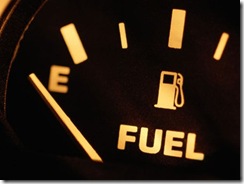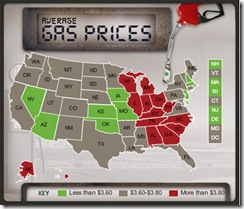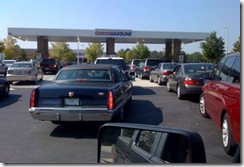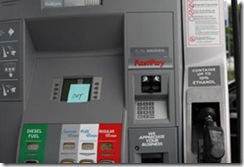In the US, States Are Going Broke
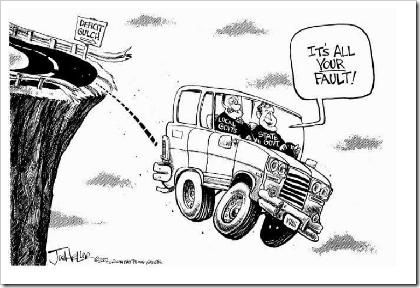 According to a study by the Center on Budget and Policy Priorities released at the end of September, an alarming 34 states are in "trouble" due to rather large budget gaps. Their report shows the states that have seen the biggest shortfalls in tax revenue in their fiscal 2009 budgets. In alphabetical order the worst are, Alabama, Arizona, California, Florida, Georgia, Maryland, Nevada, New Jersey, New York and Rhode Island. And just because you don't see your state on that list, doesn't mean it's met its budget.
According to a study by the Center on Budget and Policy Priorities released at the end of September, an alarming 34 states are in "trouble" due to rather large budget gaps. Their report shows the states that have seen the biggest shortfalls in tax revenue in their fiscal 2009 budgets. In alphabetical order the worst are, Alabama, Arizona, California, Florida, Georgia, Maryland, Nevada, New Jersey, New York and Rhode Island. And just because you don't see your state on that list, doesn't mean it's met its budget.
States NOT on the list are Alaska, Colorado, Idaho, Kansas, Louisiana, Missouri, Montana, Nebraska, New Mexico, North Carolina, North Dakota, Oregon, Pennsylvania, South Dakota, West Virginia and Wyoming. These states can meet their budget requirements however, it does not mean that major cuts haven't been made.
The snowballing is beginning on the state levels. If no one believes that this country is in a recession think of this: First more and more people are without jobs, thus their income falls, thus they are no longer paying in state income tax. This of course means the state does not receive the amount of income as it did. So, state's don't have the funds as they once did. In the states that are coming up seriously short, it will directly effect you.
How are the states trying to "fix" their budget problems? But cutting out that which Americans need the most right now due to their income dropping like a stone in water. And some states are getting around the Federal reduction in taxes from the federal economic stimulus legislation enacted earlier this year, by changing their state codes thus raising your state taxes.
The total of all the "gaps" for 34 states is $53.4 billion. Aren't you glad your government is looking out for your best interest by giving $700 billion to all the banks? Aren't you glad that we aren't in a recession. Aren't you glad that President Bush says everything is going to be alright, but it's just gonna take time... ya okay... I'll just live off the interest of my investments.. oh wait............
More with examples of cuts, all the states that have a "gap" and the worst states for "gaps".
Examples of cuts:
-
Public health programs: At least 14 states have implemented or are considering cuts that will affect low-income children’s or families’ eligibility for health insurance or reduce their access to health care services. For example, Rhode Island has eliminated health coverage for 1,000 low-income parents, and New Jersey has cut funds for charity care in hospitals. In Tennessee, an estimated 30,000 to 40,000 seriously ill people are expected to lose hospitalization and other medical services provided through TennCare.
-
Programs for the elderly and disabled: At least 11 states are cutting medical, rehabilitative, home care, or other services needed by low-income people who are elderly or have disabilities, or significantly increasing the cost of these services. For example, Florida has frozen reimbursements to nursing homes and relaxed staffing standards and Rhode Island is requiring low-income elderly people to pay more for adult daycare. Tennessee has reduced community-based services for people who are mentally retarded.
-
K-12 education: At least 13 states are cutting or proposing to cut K-12 and early education; For example: Florida cut school aid by an estimated $130 per pupil, Nevada eliminated funds for gifted and talented programs, and Rhode Island is eliminating early education funding for 550 children.
-
Children's Services: Illinois has reduced funding for child welfare, mental health, youth services and other programs.
-
Colleges and universities: At least 17 states have implemented or proposed cuts to public colleges and universities. For example, Alabama, Kentucky, and Virginia have all cut university budgets and/or community-college funding, resulting in tuition increases of 5 percent to 14 percent.
-
State workforce: At least 19 states have proposed or implemented reductions to their state workforce. New Jersey is reducing its workforce by 2,000 employees through early retirement, lay-offs and attrition. In Tennessee, the governor announced the elimination of over 2,000 state positions - about 5 percent of the state workforce. Some 1,500 employees accepted buy-outs for early retirement. In Kentucky, the public defender will eliminate 10 percent of positions (54 positions) and decline certain types of cases including family court cases, probation and parole revocations and some types of involuntary commitments and misdemeanors; hiring freezes have been instituted in Arizona, California, Connecticut, Delaware, Georgia, Minnesota, New Hampshire, Virginia and Washington.
-
Raising Taxes and "Sin" Tax: New York has enacted tax and fee increases. Large liquor retailers in New Hampshire, will pay more in state taxes along with a tobacco tax increase. Several states, including Maine, Oklahoma, Rhode Island and Vermont, changed their tax codes to avoid revenue loss that would otherwise have occurred due to the federal economic stimulus legislation enacted earlier this year.
-
Various: New Mexico was forced to put off a $500 million bond sale. Massachusetts had to pull the plug halfway into a $400 million offering. Maine is considering canceling road projects that were to be funded with bonds. South Carolina Governor Sanford said legislators shouldn't be paid to return to Columbia to fix a state budget shortfall because they created the problem, saving taxpayers $50K daily.
In order of budget gap (as a % of the total budget), from lowest to highest of the worst. (NOTE: The unemployment rates are the most current state rates available, being August 2008 published on September 16, 2008. The national unemployment for September, 2008 was 6.1%):
Rhode Island
Budget Gap: 31.1%
Gap: $430 Million
August Unemployment Rate: 8.8%
Proposed cuts to the public college system and aid for municipalities, as well as tighter limits on welfare benefits are planned. The state has reduced the maximum income level at which parents can receive public health insurance from 185 percent of the federal poverty line to 175 percent. This will eliminate coverage for approximately 1,000 parents. More than 7,800 low-income families will also have to pay higher monthly premiums for public health insurance.
Low-income elderly people now must pay higher rates for subsidized adult daycare. This is estimated to affect more than 1,200 people with incomes below $20,000.
State aid has been frozen for K-12 education at last year's levels in nominal terms and reduced the number of children who can be served by Head Start and similar services by more than 550.
Fund have been cut for affordable housing, eliminated health insurance for home-based child care providers, restricted TANF cash assistance for children, reduced health insurance for retired state workers and cut support to localities by $10 million.
A reduction in the state workforce by 2,000 or more employees via encouraging early retirement, but has announced that it will lay off workers if needed.
A tax credit for foreign taxes paid was eliminated, a tax credit for motion picture production was capped, a moratorium on new projects qualifying for the historic structure tax credit was placed, and fees were increased.
Connecticut
Budget Gap: 2.6%
Gap: $450 Million
August Unemployment Rate: 6.4%
In Connecticut, home to many Wall Street employees, the state budget hole has more than doubled in a month to $300 million and now to $450 million. The governor has ordered budget cuts to programs that help prevent child abuse and provide legal services for foster children. There is currently a freeze on hiring.
Alabama
Budget Gap: 9.5%
Gap: $784 MIllion
August Unemployment Rate: 5.3%
Alabama closed some corporate tax loopholes, and made cuts to colleges and universities. The Department of Human Resources has announced it will end in August home-makers services of approximately 1,100 older adults. These services often allow people to stay in their own homes and avoid nursing homes.
Minnesota
Budget Gap: 5.4%
Gap: $935 Million
August Unemployment Rate: 5.8%
Policymakers capped enrollment at current levels for a program that provides expanded health services and care coordination for people with disabilities.
There is currently a freeze on hiring.
Maryland
Budget Gap: 7.2%
Gap: $1.1 Billion
August Unemployment Rate: 4.5%
Maryland enacted a $1.35 billion tax increase in late 2007, which along with $277 million in budget cuts, is designed to help address the state's deficit. However, due to the declining economy an additional gap of $270 million has occurred. This is likely to be addressed by further spending cuts.
Nevada
Budget Gap: 16%
Gap: $1.2 Billion
August Unemployment Rate: 6.9%
Nevada has the worst foreclosure rate in the nation and its economy has slowed dramatically this year. Nevada has no state income and derives its income from sales tax and casino tax. Since people do not have the amount of "extra" money to use on vacations, and since Reno, Las Vegas and most of the rest of the state lives of tourism, income has drastically declined. The governor capped the state's children's health program and increased children's health-care premiums, and cut funding for K-12 education, higher education and welfare.
The governor has capped the State Children's Health Insurance Program at its approximate current number of enrollees and increased the premiums that families must pay. As a result, many applicants will be denied coverage, even though the economy is weakening and need consequently is rising. Health services for some pregnant women have also been eliminated.
The welfare agency will make it harder for low-income families to receive cash assistance and health insurance, for instance by increasing the amount of time before which some families that have lost benefits may reapply.
The governor has ordered various cuts to K-12 education, including delaying an all-day kindergarten expansion, cutting per pupil expenditures by $400 in a pilot program, eliminating funds for gifted and talented programs, eliminating funds for a magnet program for students who are deaf or hard of hearing, and made across-the-board cuts.
Massachusetts
Budget Gap: 4.3 - 4.5%
Gap: $1.2 - $1.3 billion
August Unemployment Rate: 5.1%
Whenver Administration and Finance (A&F) determines that revenues will be "insufficient to meet all fo the expenditures authorized to be made from any fund, whether by appropriation or distribution," the commissioner must notify the governor and the House and Senate committees on Ways and Means, in writing, and certify the amount of the "probably deficiency." The governor must act within 15 days of receiving notification.
Governor Patrick is preparing to make budget cuts using the emergency powers granted to him under his section "9C" which refers to a section of the MA General Laws - Chapter 29 - that governs state finances. Section 9C deals specifically with revenue deficiencies, and what steps the executive branch should take to ensure a balanced budget.
There are some restrictions to the 9C and use, for example, the governor cannot renege on contractual obligations, nor can he cut accounts governing pensions or Medicaid.
Ohio
Budget Gap: 4.5%
Gap: $1.3 Billion
August Unemployment Rate: 7.1%
Ohio plans to close two mental health facilities.
The governor has announced plans to eliminate as many as 2,700 positions, about 4.5 percent of the state workforce. The reductions will be achieved through a combination of early retirements, lay-offs, and unfilled vacancies.
Georgia
Budget Gap: 8.7%
Gap: $1.8 Billion
August Unemployment Rate: 6.4%
The governor has asked state agencies to cut 4% to make up an expected shortfall in the $21 billion budget for the coming fiscal year.
The Governor has withheld funds from the Homeowners Tax Relief Grant which passes state money to counties sot hat they can provide property tax credits to homeowners, thus casing localities to roll back the credits, or fund them from their own resources.
Six out of seven state run parks lodges are money losers, according to the state. Toilets at the Amicalola Falls State Park Visitor Centers have been closed due to budget cuts and portable toilets are put in place. The park doesn't have the money from the state to fix a sewage problem in the bathrooms. Hours are being reduced at many parks. One of every eight jobs at state parks remains vacant. Half a dozen parks and historic sites have been closed for two to four days a week, as fewer staff cover more than one property.
At Fort Yargo State Park there are only two "badges" on the 1,814 acre park who carry guns, write traffic tickets, and answer the calls for 3am unruly campers. How they control costs is by leaving one position vacant, and reducing the number of times they patrol the campgrounds.
Arizona
Budget Gap: 19.9%
Gap: $2 Billion
August Unemployment Rate: 5.8%
The state reduced the Medicade rolls by increasing the frequency with which some adult recipients must reapply for benefits. Arizona has also cut funding for community health centers and state universities along with vaccines. They have also put a freeze on hiring.
Eliminated was temporary health insurance for people with disabilities coping with serious medical problems.
New Jersey
Budget Gap: 7.7%
Gap: $2.5 Billion
August Unemployment Rate: 5.7%
The state legislature passed a $32.8 billion budget that is $600 million less than last year's budget. New Jersey plans to trim the budget by offering early-retirement incentives for state employees through attrition, or a reduction in number by 2,000 by leaving vacancies and laying off staff.
Property tax rebates for households with incomes over $150,000 are eliminated and reduced for others. A public utility tax that was scheduled to end in 2010 has been extended to 2013. A renters' credit for families with incomes under $50,000, previously worth $200 or more per family, has been cut to a maximum $80 per family for non-elderly, non-disabled renters.
Florida
Budget Gap: 19.9%
Gap: $5.1 Billion
August Unemployment Rate: 6.8%
Florida also has no state income tax. The $66 billion Florida budget for the coming year is about $6 billion less than the one approved the previous year. It includes a $332 million reduction in public school spending and cuts to state hospitals, nursing homes, and various social programs.
Aid has been cut to local school districts for the current year by $130 per pupil.
Nursing homes and other providers will not get scheduled cost-of-living adjustments in their reimbursements and staffing standards will be relaxed for one year in the expectation that the freeze would result in staffing cuts. Medicade reimbursements to hospitals and community based services for the elderly, such as meals and homemaker services, have also been cut.
New York
Budget Gap: 9.8%
Gap: $5.5 Billion
August Unemployment Rate: 5.6% (NY State), 5.9% (NYC)
Governor Patterson said the state could face an "economic blood bath" as the budget hold continued to worsen. "We are in a very serious economic crisis. There's no way to sugarcoat it," he said in a public meeting last Friday.
The state made cuts to the health insurance program for low-income families, and enacted tax and fee increases. There is a hiring freeze and further agency reductions of 7 percent, in addition to a 3.35 percent reduction in spending in April.
The budget raises approximately $1.5 billion in revenue through a variety of measures including closing tax loopholes, delaying tax credits, raising cigarette taxes, requiring collection of taxes for more on-line purchases, and increasing various fees.
Paterson said that he will also seek some $2 billion worth of cuts, because of his fears that the state's taxpayers will continue to decline. And he said he was taking the steps to try to hold off a downgrade in the states credit rating.
California
Budget Gap: 22%
Gap: $22.2 Billion + $250 million court ordered
August Unemployment Rate: 7.6%
As of today, California sits $1 billion in the red. Governor Arnie sent a letter (PDF) last week warning Paulson, the Secretary of the Treasury, this week that the great state of California "might" need to borrow $7 Billion from the Feds, if credit market's don't ease and banks don't start loaning money again, to pay for salaries and other operating costs. The money needs to be in the state's bank account by October 28th to be able to fund a scheduled $3 billion payment to more than 1,000 school districts. The state was also thinking about planning a $7 billion bond sale.
The state did however, enact a budget that imposed cuts to the state's health insurance program for the poor and other social service programs.
There is currently a freeze on hiring.
They also reduced the State Children's Health Insurance Program, increasing co-payments and reductions in dental services. The state will also require more frequent eligibility determinations for Medi-Cal recipients and is cutting payments to health care providers significantly through February of next year.
Cost-of-living adjustments are suspended to cash assistance programs for low-income families and cutting child care subsidies.
Revenues will be increased in the current fiscal year by limiting certain business tax credits and suspending corporate "net operating loss deductions." Other revenue increases in the current year will come from accelerating tax withholding.
And if all that isn't enough, U.S. District Court Judge Thelton Henderson on Wednesday ordered the state to prepare to turn over $250 million to the federal receiver charged with improving health care in the state's prisons. Altogether, the receiver is seeking $8 billion.
States Budget Gaps:
| TABLE 2: | ||||
| State | Gap before budget was adopted | Additional mid-year gap | Total | Total Gap as Percent of FY2009 General Fund |
| Alabama | $784 million |
| $784 million | 9.5% |
| Arizona | $1.9 billion | $100 million | $2.0 billion | 19.9% |
| Arkansas | $107 million |
| $107 million | 2.4% |
| California | $22.2 billion |
| $22.2 billion | 22.0% |
| Connecticut | $150 million | $300 million | $450 million | 2.6% |
| Delaware | $217 million |
| $217 million | 6.0% |
| District of Columbia | $96 million | $131 million | $227 million | 3.6% |
| Florida | $3.4 billion | $1.7 billion | $5.1 billion | 19.9% |
| Georgia | $245 million | $1.6 billion | $1.8 billion | 8.7% |
| Hawaii |
| $162 million | $162 million | 2.8% |
| Illinois | $1.8 billion | Yes, DK size | $1.8 billion | 6.3% |
| Iowa | $350 million |
| $350 million | 5.5% |
| Kentucky | $266 million |
| $266 million | 2.9% |
| Maine | $124 million |
| $124 million | 4.1% |
| Maryland | $808 million | $269 million | $1.1 billion | 7.2% |
| Massachusetts | $1.2 billion | Yes, DK size | $1.2 billion | 4.3% |
| Michigan | $472 million |
| $472 million | 4.8% |
| Minnesota | $935 million |
| $935 million | 5.4% |
| Mississippi | $90 million |
| $90 million | 1.8% |
| Nevada | $898 million | $275 million | $1.2 billion | 16.0% |
| New Hampshire | $200 million | Yes, DK size | $200 million | 6.4% |
| New Jersey | $2.5 billion |
| $2.5 billion | 7.7% |
| New York | $4.9 billion | $630 million | $5.5 billion | 9.8% |
| Ohio | $733 million | $540 million | $1.3 billion | 4.5% |
| Oklahoma | $114 million |
| $114 million | 1.7% |
| Rhode Island | $430 million |
| $430 million | 13.1% |
| South Carolina | $250 million | $140 million | $390 million | 5.7% |
| Tennessee | $468 million |
| $468 million | 4.1% |
| Vermont | $59 million | $24 million | $83 million | 6.8% |
| Virginia | $1.2 billion | Yes, DK size | $1.2 billion | 7.1% |
| Wisconsin | $652 million |
| $652 million | 4.6% |
| TOTAL | $47.6 billion | $5.9 billion | $53.4 billion | 10.0% |
FEDERAL BUDGET
If you would like to see what your state receives from the Federal Government, head on over to the White House website for Fiscal Year 2009, State by State, Federal Budget.
RANT ON
So, States are considering going to the Feds for help, with California officially saying that "might" need help. Now, we've already seen bailouts of banks and various financial institutions, that "officially" are to the tune of $700 Million, but have been estimated to be more than $1.8 Billion by the time it's done and over with. So how long do you think all this money from the Feds is going to last? I mean if the states are suffering from lower income tax, isn't the Federal Government going to suffer from the same? - RANT OFF.
